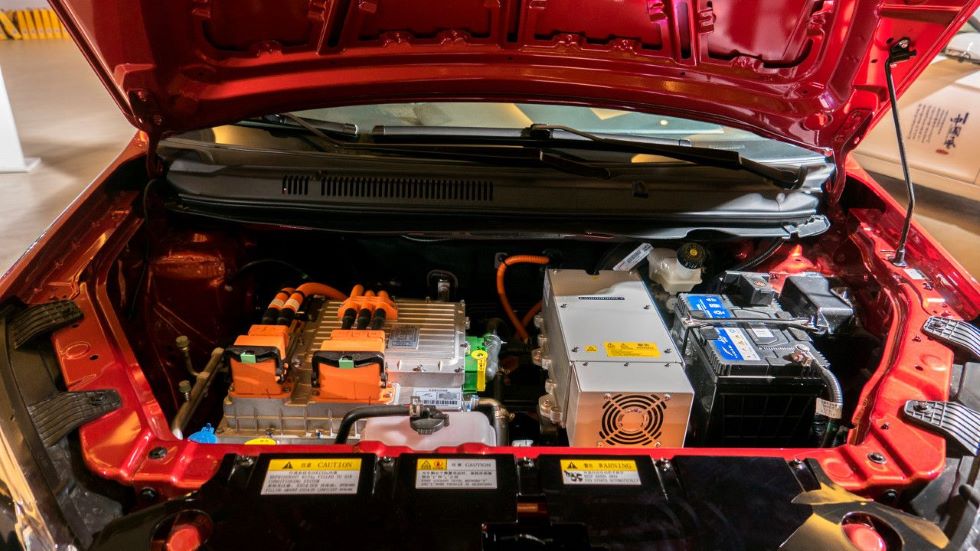11 Dec 2024

Tired Earth
By The Editorial Board

Batteries in a new Chinese EV. Where do the go when the need replacing? (Photo by Zhang Peng/LightRocket )
Electric vehicles (EV) are all the rage these days. They are, according to President Biden and much of the media, a crucial part of reducing greenhouse gas emissions and saving the environment. Federal and state subsidies have long encouraged their use. The president in his infrastructure proposals would increase that encouragement by building some 500,000 recharging stations across the country. The presence of EVs on roads has expanded rapidly in the United States and especially in Europe. Though few can doubt the claims made for them, greenhouse gases are not the world’s only pollution concern. As China, a leader in EVs, is finding out, the disposal of EV batteries presents separate and severe environmental risks. That country’s experience may offer a glimpse of this country’s next environmental scare.
EVs – pure and hybrid – are rapidly gaining currency. According to the latest Department of Transportation figures, almost 2 million of these vehicles are on this country’s roads already, still a small percentage of the total but three times the number of four years ago. And it is little wonder. Aside from a genuine desire on the part of owners to help fight climate change, the federal government has long offered a tax credit of up to $7,500 on the purchase of one of these cars, and some states add to that. The European Union, where there are also heavy subsidies and perhaps a greater public sensitivity to environmental issues, has some 3.2 million EVs on its roads, while the United Kingdom as almost 800,000. But China is the global leader. It produces more than half the world’s EVs and its roads support about half the world’s outstanding number, estimated by the Chinese government to reach some 5.8 million vehicles this year.
And now because of China’s EV dominance, that country is discovering a new and severe environmental problem. EV batteries are toxic and carry great power to pollute. Early on, the problem was less evident. These batteries last for 5 to 8 years so it took time before China needed to find ways to dispose of them safely. But in the last year, China had to get rid of some 200,000 tons of these things. The government expects that number to grow to 800,000 tons over the next four years, an annual growth rate of over 40%.
EV batteries contain heavy metals such as cobalt and nickel, neither of which break down in nature. They also contain manganese that can pollute soil and water as well as air. Only 500 micrograms of magnesium in a cubic meter of air will produce manganese poisoning in most people. As lithium batteries degrade, they produce hydrogen fluoride and other pollutants. China has already had to deal with a bout of manganese poising tied to battery disposal in Guangdong Province. To give a sense of levels of toxicity, one scientist involved in the Guangdong incident, Professor Wu Feng of the Beijing Institute of Technology explained that one “20-gram cell phone battery can pollute three standard swimming pools of water, and if abandoned on land, it can pollute one square kilometer for 50 years.”
In part, China’s problems stem from incomplete policing (not an especially common occurrence in that country.) Even the Chinese Communist Party, ever loath to admit any failing on any front, admits that over the years about half the batteries have been disposed of improperly. In part a response to this recognition but also with a broader understanding of the scope of the potential problem, the Party has committed to stricter supervision. But if this policing problem can explain the Guangdong problem, it says only little about the potential pollution problem everywhere as numbers of EVs grow and their batteries age.
There is no suggestion here that the United States or any other country give up on electric vehicles. They will help with greenhouse gas emissions and in any case run a lot cooler and quieter than conventional vehicles, both recommendations in themselves. No doubt future technologies will rid EV batteries of their toxicity and find better ways to dispose of them. But even with all the benefits – present and future – this potential pollution problem should remind both the country’s public and its officials that EVs are not the unmitigated good some pretend they are and that greenhouse gases, no matter how much they sit in the fronts of people’s minds these days, are far from the only environmental problem. China’s present is a clear warning of tomorrow’s potential troubles.
Source : forbes.com
Comment